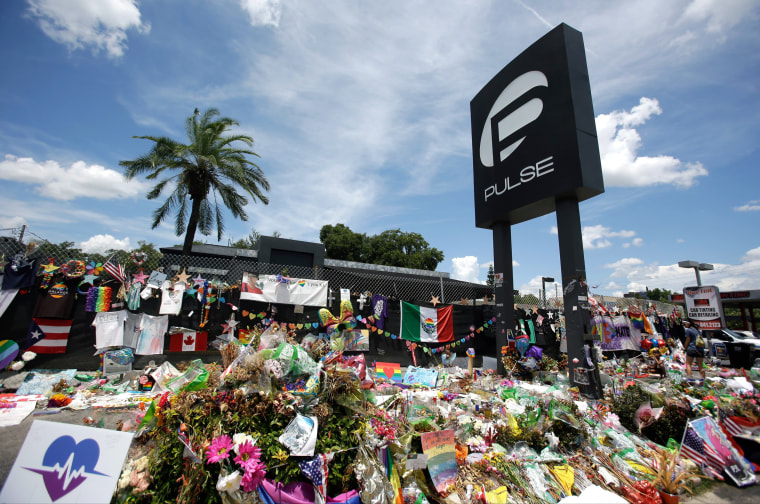Pulse Shooting Survivors Organize Ex-gay ‘Freedom March’ in Orlando
Angel Colon and Luis Javier Ruiz survived the 2016 mass shooting at the gay nightclub Pulse in Orlando, Florida, where 49 patrons died. Now the two men, who no longer identify as gay, are organizing a “Freedom March” that encourages attendees to embrace Jesus and overcome their homosexuality and transgender identity.
The rally is scheduled for Sept. 14 at Orlando’s Lake Eloa Park, just a five-minute drive from where the shell of the former nightclub still stands.
Colon, 29, and Ruiz, 36, were among the 53 people injured after what was at the time the deadliest mass shooting in the United States. Colon, a dancer, was shot six times and was unable to walk for two months. Ruiz, an Army veteran, was trampled upon while trying to exit the club and sustained multiple injuries.
Related
Ilhan Omar throws support behind LGBTQ Palestinian group
Nearly two years ago, the pair founded Fearless Identity Inc., an organization that seeks to “bring hope” and “biblical understanding to those seeking to change,” Ruiz told NBC News.
Colon, who posed on the cover of LGBTQ magazine The Advocate for its 2016 People of the Year issue, said the mission of Fearless Identity has been misunderstood. While neither he nor Ruiz still identify as gay, he said the organization’s goal is not to change people’s sexual orientation and gender identity against their will.
“We’re trying to equip churches, even if they’re not gay-affirming churches, with the resources they need and teach them not to judge the LGBTQ community,” Colon explained. “We’re trying to share our stories through ministry and share the testimonies of people who’ve come out of the homosexual lifestyle.”

Despite the men’s insistence otherwise, not everyone views the Freedom March as an opportunity to unite the church and LGBTQ people, with some from Orlando’s lesbian, gay, bisexual, transgender and queer community expressing outrage that a city still in mourning would be the site of such an event.
Christopher Cuevas, the executive director of QLatinx, an Orlando-based Latino LGBTQ advocacy group, called the march an “attempt to wash the community in a thicket of hate and bigotry.”
“While we honor the freedom for expressions of faith, and hold the beauty of religiosity in our community, we cannot condone the gross misuse of religious text and faith to exploit LGBTQ+ people or support conversion therapy,” Cuevas wrote in an email. “The expressions of our queer and transgender identities are the embodiment of divinity and grace, because we are living our most radical truth by celebrating and centering our LGBTQ+ identity.”
Both Ruiz and Colon grew up in religious communities and dealt with the church’s suggestion to “pray the gay away.” Ruiz, however, stressed that neither he nor Colon support so-called conversion therapy, a contentious practice of trying to change a person’s sexual orientation or gender identity that has been condemned by nearly every major health association.
“We are not all all advocates for conversion therapy or shock therapy,” Ruiz said. “We stand with the gay community, and our main message is about falling in love with Jesus, but if an LGBTQ person wanted to talk to a pastor or counselor, that’s a whole different story.”
Related
Palestinian police vow crackdown on LGBTQ events
Colon and Ruiz said the Pulse massacre inspired them to turn back to religion and denounce their former sexual identities. Now, the two men identify as “children of God” versus straight or gay.
“My life was all over the place, and I never blamed it on being gay. I was a drug addict, an alcoholic,” Colon said. “I missed worshiping God, so when Pulse happened, I took the situation as a big turning point in my life.”
Next month’s event will be the second Freedom March the two men have organized. Their inaugural march was held last May in Washington. While the event “seeks to bring hope of deliverance to the LGBTQ community and point them toward Christ,” per its mission statement, Colon and Ruiz said they believe in accepting people as they are.
“People have the option to change, to choose their own path and their own journey,” Ruiz said. “If there’s a drag queen doing a storytelling hour at a school, we’re not going to say, ‘Kick the drag queen out.’ We’re going to say, ‘Let’s also read the Bible to these kids.’”
“We come in love,” Ruiz added. “I’m so thankful that I get to live and that I’m breathing now.”